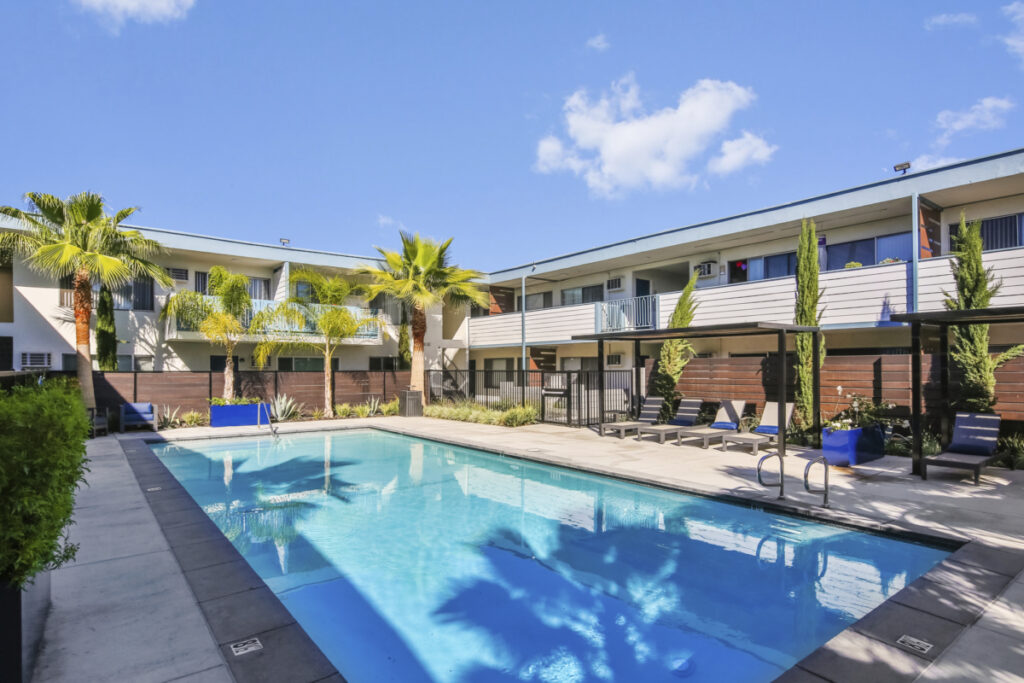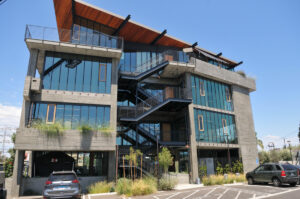In Aug. 27, Malcolm Johnson, chief executive of Langdon Park Capital, spent his birthday at his company’s Baldwin Village multifamily asset hosting a back-to-school event, handing out free sneakers, backpacks and school supplies to children who live on the property.
The event summed up Johnson’s mission with Langdon Park Capital, a Black-owned real estate investment company with a commitment to addressing the unmet demand for high-quality workforce housing in underserved Black and Latino communities.
“We really approach our investment with the community in mind first and foremost,” Johnson said.
Langdon Park Capital has been growing, and earlier this month announced the $48.6 million acquisition of a 138-unit multifamily property in West Covina.
Dean Zander and Stew Weston of CBRE Group Inc. represented the sellers on the Atrium at West Covina property, which will be rebranded as Langdon Park at West Covina. It is located within a predominately Latino community in which the annual median family income is nearly 25% below the metropolitan area’s average of $80,000.
Langdon Park plans to allocate more than $3 million for capital improvements and interior unit upgrades at the property.

Other purchases
The West Covina acquisition marked the firm’s fourth purchase this year, bringing assets under management to more than $148 million. It comes on the heels of two previous investments by Langdon in Los Angeles, as well as an investment earlier this year in Washington, D.C.
“This latest acquisition underscores Langdon Park Capital’s mission to support the teacher, hospital worker and firefighter who are experiencing the brunt of rent hikes across the country and are at risk of being pushed out of the communities where they have lived for years,” said Raymond Junior, head of residential acquisitions at Langdon Park Capital. “We look forward to working closely with our community partners to create a safe, affordable and thriving residential community, all while delivering strong returns for investors.”
“Preserving workforce housing in Black and Latino communities has never been more important, particularly as families are impacted by continued volatility amid interest rate hikes, rising inflation and limited housing supply,” Johnson added. “Langdon Park Capital’s cultural competency in Southern California markets like West Covina, coupled with the lived and rich professional experiences of our leadership team, positions us to create a strong residential community that provides more than just a place to live for our tenants. Langdon Park Capital’s asset management team will be hands-on in every way here.”
Whether it is a Langdon property in South L.A., Hollywood, Washington D.C., including suburban Maryland and Northern Virginia or — soon — Oakland, Johnson said that his acquisitions preserve affordable housing for a certain stratum of demographics.

“These are families who earn too much to qualify for any housing subsidy, but in many cases, because of the high cost of living, they also don’t have the funds to purchase a single-family home so they’re renters by necessity, Johnson said.
The amenities that Langdon adds to its multifamily properties are meant to enhance the community, not just the apartment units themselves.
“A high-quality residential neighborhood is one that first and foremost feels like a neighborhood,” Johnson said. “We don’t put bars on our windows.”
Partnerships
Langdon Park also offers social services directly to families who live on its properties. The firm partners with Esusu Financial Inc., a minority-owned fintech platform that helps residents at its properties build stronger credit histories and achieve financial stability.
“On a voluntary basis, renters are able to sign up and have their monthly rent payments reported to the three major credit bureaus,” Johnson said. “What you see is a boost in credit scores for families who live in our building. That boost in credit scores means they have access to market-rate credit to do things like start a business, purchase a car, send a child to college and pay market-rate student loan debt.”
Additionally, Langdon uses the services of local public schools and healthcare centers to meet the unique needs of community residents.

Strategic partners Kennedy Wilson and Eldridge Industries continue to provide support for Langdon with capital and resources.
“They’re willing to look at returns and see beyond just the financial aspect to the investment,” Johnson said. “What else happens in the community to improve it?”
Johnson, who was born and raised in Washington, D.C., said a commitment to the community is important.
His company is named after Langdon Park Recreation Center, which was crucial in his upbringing. Johnson attended the University of Notre Dame on a football scholarship and played NFL football for two seasons with the Pittsburgh Steelers and New York Jets before veering into real estate.
Now, he has a few things he takes into consideration when looking at possible acquisitions.
“These are all places with access to freeways and lots of higher education, big job centers but also big concentrations of Blacks and Latinos,” Johnson said. “We typically try to purchase larger assets where we can have real scale in a submarket.”
In addition to the West Covina buy, Langdon has purchased a 304-unit building in suburban Washington D.C. for $63 million, and a 177-unit apartment complex in Hollywood for $36.9 million. Langdon rebranded the latter as Langdon Park at Hollywood Studios.
Langdon Park’s Hollywood asset is located in a largely Latino area, while Langdon Park at Baldwin Village stands in a largely Black and Latino neighborhood.
“The real opportunity lies in going after neighborhoods that have been often overlooked with not a lot of institutional investment,” Johnson said.
